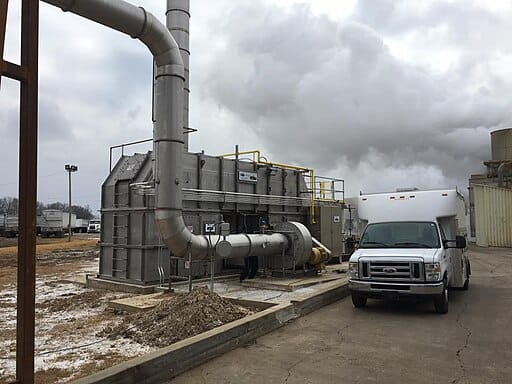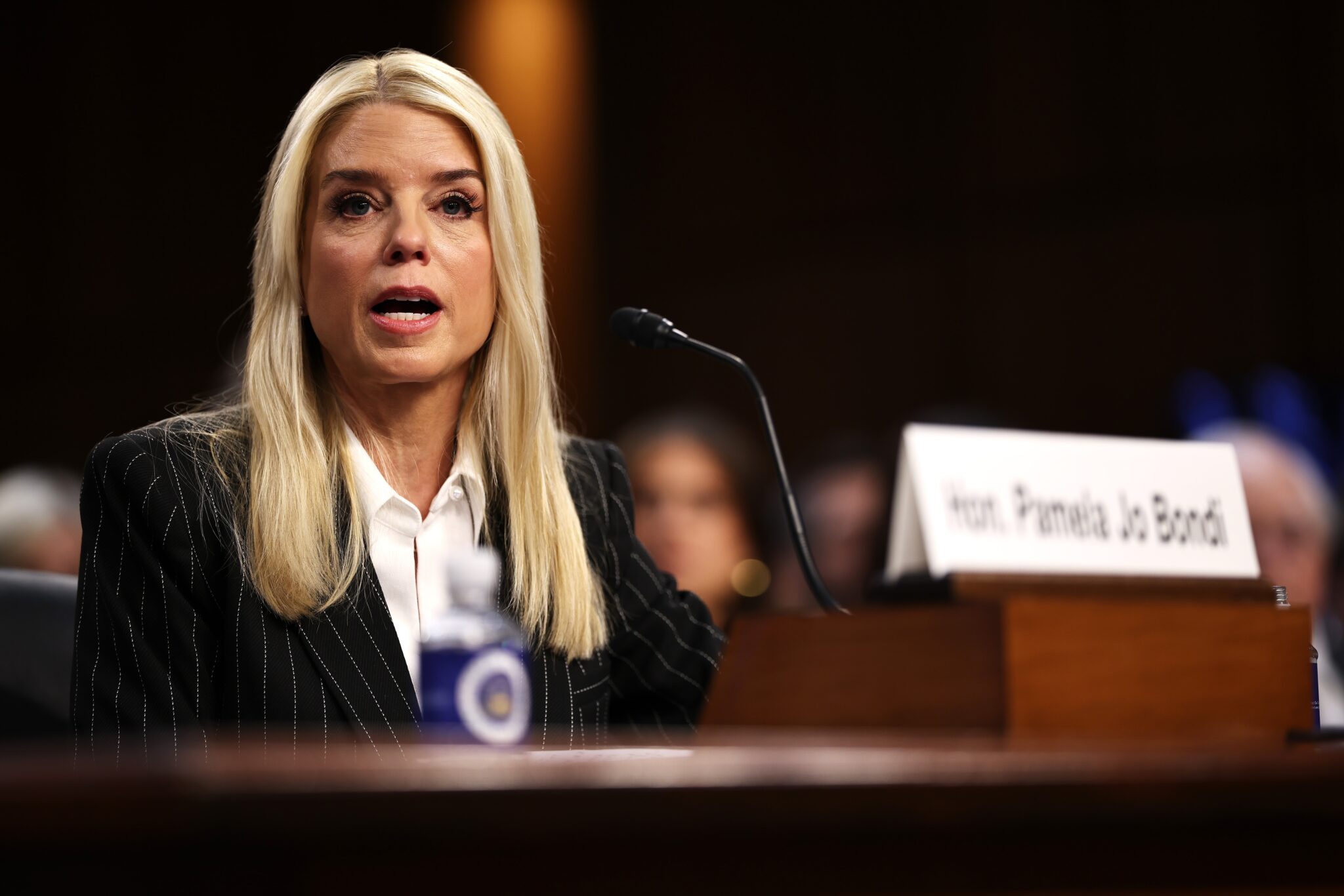Residents along LA’s Alameda Corridor are tired of polluting businesses
U.S. Department of Justice sues Maine over transgender athlete policy; Walmart gunman will go to Texas state prison after guilty plea

It's Friday, April 18, 2025, and in this morning's edition we're covering: Los Angeles residents are tired of polluting businesses, Walmart gunman will go to Texas state prison after guilty plea, U.S. Department of Justice sues Maine over transgender athlete policy, Current Secretary of the Interior visits Alabama mine with many safety violations, Protests and police action roil Rep. Marjorie Taylor Greene's town hall, N.C. Senate's GOP budget heads to the House, N.C. Senate’s ‘modest’ budget is big on Helene recovery and income tax cuts, Two police officers who killed a Jackson, Miss. man face a manslaughter indictment. Washington Metropolitan Area Transit Authority's funding is uncertain.
Media outlets and others featured in this edition: Los Angeles Public Press, El Paso Matters, Maine Morning Star, Inside Climate News, Atlanta Civic Circle, NC Newsline, Carolina Public Press, The 51st.
To continue reading the rest of each article, please click the link at the end of the excerpt.
A new resource from the State Democracy Research Initiative makes the current text of all 50 state constitutions available and searchable on one site. This was from State Court Report.
Bolts has a guide to each state's supreme court.
Journalist Ben Ledbetter started and edits Down Ballot, a weekly curated report of state and local government news from nonprofit news sources. These weekly reports will remain free.
Locals along LA's Alameda Corridor cheered as a local trucking business operating illegally for years was recently shut down — but on Tuesday, the property owners appealed the decision.
by Ashley Orona 04/08/2025
In a crowded wood-paneled meeting room in South Gate, David Moreno held up his inhaler.
“I’m 45, and I’ve had this for most of my life because of the air quality in the area,” he said, facing city leaders during the South Gate Planning Commission meeting last month. Moreno, who has asthma, lives in unincorporated Walnut Park, a few blocks from the industrial district known as the Alameda Corridor.
The Alameda Corridor is a 20-mile-long vein connecting the Long Beach and Los Angeles ports to the downtown LA rail yards. It passes through various Southeast LA cities. A freight train runs through a trench here carrying upwards of 12,300 containers daily — a volume large enough to fill Disneyland, according to the Alameda Corridor Transportation Authority, the governing body of the freight train. The train runs adjacent to Alameda Street, where cars and semi-trucks drive though it at speeds as if it were a freeway.
So when the South Gate Planning Commission unanimously voted March 18 to shut down a trucking company in the corridor that was operating for about five years without permits, residents took it as a small win and a relief. A business on the corridor was finally being held accountable for spewing the type of pollutants that are so detrimental to lung health.
Accountability, however, is tricky. Despite the planning commission’s decision, the northern part of the property where the business operates actually falls under the jurisdiction of unincorporated LA County — and is therefore still allowed to operate.
On Tuesday, the property owners appealed the planning commission’s decision, which means that the South Gate City Council will now vote on whether to shut down the business. The city council is also scheduled to take up a vote on rezoning the property in two weeks, which may give another pathway for the business to continue operating.
But residents said they don’t trust the city council to uphold the planning commission’s decision and also question why the city knowingly allowed the company to operate for so long illegally.
At last month’s planning commission meeting, Moreno told the crowd that trucks from Alameda Engle Properties would rumble well into the night, sometimes past 10 p.m. Living so close, he said he hears a lot of noise and can feel vibration from the trucks in his home. Moreno said he’s also noticed pets in the area dying, which he suspects, but has not confirmed, may be from possible poison being used to repel rodents in the nearby businesses.
“I’m tired of seeing such an ugly thing in my neighborhood,” he said.
The California Air Resources Board calls the Alameda Corridor a source of pollution in the region due to the many industrial facilities there that routinely process chemicals, as well as warehouses, auto body shops, and manufacturers. Driving through Alameda, you see rows of businesses but few trees and sparse greenery to help offset the pollution.
“You turn onto Alameda and you could smell it, like burnt tires,” said Robert Montalvo, who lives in South Gate.
Other local industry corridors like the 710 freeway have captured attention due to their association with health risks such as respiratory issues from the high levels of truck emissions. But much less research is available on the Alameda Corridor, despite locals reporting health concerns like nosebleeds and headaches. That includes South Gate Planning Commissioner Lizette Ruiz, who shared at the meeting last month that her niece, who used to live by the corridor, would suffer from nosebleeds.
“I do believe these concerns to be valid and truthful,” said Ruiz. “I have seen them.”
About 200 South Gate and unincorporated LA County residents signed a petition in 2023 asking the city to shut down the business. “As communities of color, we already bear disproportionate negative effects from the environmental injustices we suffer in our communities. Every day, these trucks spew toxic particulate matter into our homes and community,” read the petition. The corridor runs through cities including Compton, Lynwood, South Gate, Vernon, and parts of unincorporated LA County.
Read More: Residents along LA’s Alameda Corridor are tired of polluting businesses – Los Angeles Public Press
Walmart gunman will go to Texas state prison after guilty plea, not federal facility like ‘supermax,’ official says
by Robert Moore April 15, 2025
Sign up for essential news about El Paso. Delivered to your inbox — completely free.
The gunman who killed 23 people and wounded 22 others at an El Paso Walmart in 2019 will begin serving his life sentences in a state prison in Texas after his scheduled guilty plea next week, a spokesperson for the federal prison system told El Paso Matters.
“The sovereign which first arrested the offender has primary jurisdiction over the offender for purposes of trial, sentencing, and incarceration,” said Donald Murphy, spokesperson for the Federal Bureau of Prisons. “A review of this matter reveals Mr. (Patrick) Crusius was initially arrested by local authorities and is currently under the primary jurisdiction of the state of Texas. Should he be sentenced on their charges, he would enter the custody of the Texas Department of Criminal Justice for service of his sentence.”
Amanda Hernandez, spokesperson for the Texas Department of Criminal Justice, which oversees the state prison system, agreed with Murphy but said federal and state governments can discuss who will incarcerate inmates convicted in both systems.
“Typically, the sovereign which first arrested the offender has primary jurisdiction over the offender for purposes of trial, sentencing, and incarceration. However, there are avenues for state and federal authorities to coordinate on this issue,” Hernandez said.
Crusius, now 26, has admitted that he drove from his hometown of Allen, Texas, and used a semiautomatic rifle to gun down shoppers at the Cielo Vista Walmart on Aug. 3, 2019. Shortly before opening fire at the store, he posted a screed on the internet saying he was acting to stop “the Hispanic invasion of Texas.”
He is expected to plead guilty Monday to state charges of capital murder and aggravated assault with a deadly weapon, and be sentenced to life in prison without possibility of parole.
In 2023, he pleaded guilty to federal weapons and hate crime charges stemming from the attack and was sentenced to 90 consecutive life terms in federal prison, one for each of the people he killed or wounded. The federal judicial system doesn’t allow parole.
At the federal sentencing, U.S. District Judge David Guaderrama recommended that Crusius serve his sentence at the federal “supermax” prison in Florence, Colorado. It is considered the nation’s most secure prison and has housed terrorists, mob bosses and other notorious criminals.
Guaderrama’s recommendation wasn’t binding on the Federal Bureau of Prisons.
Joe Spencer, a defense attorney for Crusius, said the federal prison system could seek custody of his client by filing a writ of habeas corpus with a court. He said federal prosecutors – then working for the Biden administration – told him they’d prefer Crusius serve his sentence in a federal prison, but he said he didn’t know if the Trump administration still held that view.
The U.S. Attorney’s Office for the Western District of Texas, which would file any writ seeking custody of Crusius, didn’t immediately respond to El Paso Matters’ questions about whether it would seek to have him moved to federal custody.
Spencer said he’d prefer that Crusius serve his life sentences in a federal prison.
“I don’t think he has the social skills to survive in (state prison). And that’s really why the defense wants him in (supermax) because it’s a more secure prison that I think he’ll be safer there. Because I do think he has a big target being a high-profile individual,” Spencer said.
The District Attorney’s Office declined to comment on the Federal Bureau of Prisons statement.
Read More:

U.S. Department of Justice sues Maine over transgender athlete policy
by Lauren McCauley, Maine Morning Star
April 16, 2025
The Trump administration announced Wednesday it is suing Maine over the state’s transgender athlete policy, which the U.S. Attorney General said violates federal anti-discrimination protections.
“The state of Maine is discriminating against women by failing to protect women in women’s sports, pretty basic stuff,” U.S. Attorney General Pam Bondi said during a press conference, adding that it is an issue of sports as well as safety.
Here is a running list of all of the probes and funding cuts since President Trump threatened Maine
The Justice Department is launching a civil suit against the Maine Department of Education for violating Title IX, a federal law that prohibits discrimination in schools on the basis of sex. Title IX does not reference trans people directly, but the Trump administration has interpreted Maine’s policy as discrimination against cisgender girls.
In a statement in response to the suit, Maine Gov. Janet Mills said it’s the “latest, expected salvo in an unprecedented campaign to pressure the State of Maine to ignore the Constitution and abandon the rule of law.”
“This matter has never been about school sports or the protection of women and girls, as has been claimed, it is about states’ rights and defending the rule of law against a federal government bent on imposing its will, instead of upholding the law,” Mills said.
Bre Danvers-Kidman, executive director of MaineTransNet, also said the lawsuit is an example of executive overreach.
“What the executive branch is actually doing at this moment is trampling over” the rights of Congress to dictate federal spending and “unilaterally deciding how laws should be interpreted,” which is the job of the judiciary, they told Maine Morning Star.
In a statement Wednesday, Maine Attorney General Aaron Frey said he looks forward to representing the state.
Ultimately, Frey said, “this matter is about the protections afforded by Title IX and the Maine Human Rights Act,” which includes gender as a protected class.
He said he is confident the state is “acting in accordance with those laws,” a position that he said is bolstered by the “complete lack of any legal citation supporting the Administration’s position in its own complaint.”
This matter has never been about school sports or the protection of women and girls, as has been claimed, it is about states rights and defending the rule of law against a federal government bent on imposing its will, instead of upholding the law.
– Maine Gov. Janet Mills
On Friday, the Maine Attorney General’s Office sent a letter to the U.S. Education Department’s Office for Civil Rights saying it would not comply with the department’s proposed resolution agreement, which would require the state to end its transgender protections. The state also doubled down on its assertion that the Trump administration’s interpretation of Title IX does not have legal standing.
In a letter to Bradley Burke, regional director for the agency’s Office for Civil Rights, Assistant Attorney General Sarah Forster pointed to legal precedent that has required schools to allow trans athletes to participate on teams aligning with their gender identity.
“Nothing in Title IX or its implementing regulations prohibits schools from allowing transgender girls and women to participate on girls’ and women’s sports teams,” she wrote. “Your letters to date do not cite a single case that so holds.”
Maine state Rep. Laurel Libby appeared at the Wednesday morning press conference alongside Bondi and Education Secretary Linda McMahon. The Auburn Republican has been at the center of this controversy. After sharing photos and identifying information about a transgender student athlete on her legislative Facebook page, she was censured by her peers and stripped of the right to vote or speak on the Maine House floor until she apologizes.
That post went viral and prompted the Trump administration’s scrutiny of Maine’s policy.
Bondi read off two examples of trans girls placing in girls athletic competitions, skiing and track, and recounted the initial exchange between President Donald Trump and Mills during which the Democratic governor said she’d see Trump “in court.”
Bondi also noted that two federal departments, the U.S. Department of Education and the U.S. Department of Health and Human Services, deemed Maine in violation of Title IX after brief investigations into the matter.
“We have exhausted every other remedy,” Bondi said of the suit. “We tried to get Maine to comply. We don’t like standing up here and filing lawsuits, we want to get states to comply with us.”
Bondi pointed to the many ways the federal government has punished Maine. “We’ve stripped grants from Maine through other departments and we are going to continue to fight for women,” she said.
Mills also spoke to what she described as the “politically motivated investigations that opened and closed without discussion” and referenced Friday’s federal court order requiring the U.S. Department of Agriculture to unfreeze payments related to Maine’s school meal programs, which the governor said “reinforces our position that the federal government has been acting unlawfully.”
“Let today serve as warning to all states: Maine might be among the first to draw the ire of the federal government in this way, but we will not be the last,” Mills said.
Some Republican legislators have pushed for Maine to concede to the Trump administration’s demands, with several proposing legislation that would ban trans athletes — LD 233 and LD 868 — as well as another bill that would remove gender identity from the Maine Human Rights Act. Those bills have not yet been scheduled for a public hearing.
Asked about the choice before legislators right now, Danvers-Kidman said, “Scapegoating trans people is not going to protect Maine’s federal funding.”
“If you compromise that right, it is a slippery slope,” they said. “Once you start eroding civil rights protections, they are all up for grabs.”
Correction: This story was updated with the proper last name and pronouns for Bre Danvers-Kidman.
YOU MAKE OUR WORK POSSIBLE.SUPPORT
Maine Morning Star is part of States Newsroom, a nonprofit news network supported by grants and a coalition of donors as a 501c(3) public charity. Maine Morning Star maintains editorial independence. Contact Editor Lauren McCauley for questions: info@mainemorningstar.com.

Trump Official Visits, Touts Alabama Coal Mine With Thousands of Federal Safety Violations
Secretary of the Interior Doug Burgum visited two Warrior Met mines to emphasize the administration’s commitment to lifting regulations on the extraction of ‘clean beautiful coal.’ He did not mention the company’s checkered safety and environmental record.
By Lee Hedgepeth
April 15, 2025
This article originally appeared on Inside Climate News, a nonprofit, non-partisan news organization that covers climate, energy and the environment. Sign up for their newsletter here.
TUSCALOOSA, Ala.—When Secretary of the Interior Doug Burgum visited two Warrior Met coal mines in central Alabama last week, he said he was emphasizing the administration’s commitment to “clean, beautiful coal” and its plans to roll back regulation.
The department’s press office swiftly posted on social media after the trip his ultimate goal: “Mine, Baby, Mine!”
What Burgum didn’t mention on Friday was Warrior Met Coal’s checkered safety and environmental record, which includes thousands of federal safety violations issued under both Republican and Democratic administrations. He also didn’t mention the death of Aaron Haley, a 34-year-old miner killed on the job in 2023 because, according to an investigative report by federal safety officials, Warrior Met did not keep equipment in safe operating condition.
Missing, too, from Burgum’s comments was any recognition that the coal produced by Warrior Met, metallurgical coal, is not used to power American homes or businesses. Instead, it is shipped abroad through the Port of Mobile, largely to countries in South America and Asia for steelmaking.
“Through these tours, Secretary Burgum is displaying the importance of President Trump’s executive orders which are Unleashing American Energy and putting hardworking Americans first,” a press release from Burgum’s office said after the trip. “Friday’s visit highlights the Department of the Interior’s continued focus on bolstering domestic coal production to create more jobs, lower the cost of living for Americans, and unlock more of our nation’s critical resources.”
The Department of the Interior has not responded to questions about the trip or why local reporters were not included. It did not address Warrior Met’s safety or environmental record. Warrior Met has not responded to questions about Burgum’s visit or its own environmental and safety record.
According to the department, Burgum’s first stop was Warrior Met Mine No. 4. The mine utilizes the longwall method of extraction where coal is sheared by large high-powered machinery, leaving behind vast open expanses underground that can lead to the permanent sinking of the land above. The method is faster and can be riskier than other forms of mining and has been blamed for methane leaks.
In March 2024, an Alabama grandfather was killed by an explosion in his home above Oak Grove mine, a longwall operation in nearby Jefferson County, after methane gas likely leaked into the home,
This month, just days before President Donald Trump boasted from the White House about “unleashing…clean, beautiful coal,” a West Virginia woman was severely injured from a blast at her home above a longwall mine.
On April 5, she lit a cigarette, setting off an explosion that first responders suspect was caused by a methane leak from the mine, owned by Core Natural Resources, a Pennsylvania company created by the merger in January of CONSOL Energy and Arch Resources. An investigation is continuing by state inspectors who have ordered the company to submit a revised permit for monitoring methane emissions.
Coal helped turn the United States into a global economic and military power, but coal-fired power plants emit toxic air pollution and heat-trapping gases that are changing the world’s climate in dangerous ways. Moreover, the methane that coal mining releases is a super-pollutant 80 times more potent than carbon dioxide at warming the planet over a 20-year period. Inside mines, methane also presents deadly explosion risks to miners if safety measures are not followed.
Contrary to Trump and Burgum’s clean coal assertions, coal is the dirtiest of fossil fuels.
Warrior Met’s No. 4 mine has had a history of safety violations, according to records maintained by the Mine Safety and Health Administration (MSHA), the federal regulator charged with ensuring miner wellbeing.
Since 2019, the mine has been cited by federal regulators nearly 3,000 times with safety violations. About 25 percent—731 of those violations—were labelled by MSHA as “significant and substantial,” meaning the violations were “reasonably likely to result in a serious injury or illness.” More than 100 citations have been issued since Trump took office.
Records show that the No. 4 Mine is currently undergoing two spot inspections and a “regular safety and health inspection,” investigations that have resulted so far in 25 citations. The mine’s previous complete safety and health inspection, conducted in January, February and March, resulted in 78 citations, according to regulatory records.
Less than two years ago, Aaron Haley, a West Virginia native and father of three, was killed while working inside the No. 4 Mine. An MSHA investigation into the incident faulted the mine for his death and injuries suffered by two other miners.
“On August 30, 2023, at approximately 6:50 a.m., Aaron Haley, a 34-year-old belt foreman with over 13 years of mining experience, died when a longwall belt conveyor take-up unit (take-up) component, the bridle, broke and struck him,” the report said. “The accident occurred because the mine operator did not maintain components of the take-up in safe operating condition.”
Haley’s obituary offers a more expansive sense of what was lost that day: “Aaron was kind, loving, generous, funny and would give the shirt off his back to anyone. He loved teaching [his son] baseball, football, fishing, and just ‘guy’ stuff. His two baby girls…had him wrapped around their fingers. He loved playing kitchen, restaurant and pushing them on their swings. Aaron loved his wife…dearly and took the best care of her. He was the absolute best husband, father, son, and an all-around wonderful man.”
MSHA cited Warrior Met with a violation of 30 CFR 75.1725(a), a regulation requiring that equipment “be maintained in safe operating condition.” If machinery is deemed unsafe, the regulation requires it be removed from service immediately. Since Haley’s death, the No. 4 Mine has been cited nearly 39 times for violating the same safety requirement.
Burgum’s visit to the No. 4 mine was followed, according to his department’s press release, by a “windshield tour” of Warrior Met’s planned Blue Creek facility, which is slated to be one of the largest coal mining expansions in the state’s history.
If approved by state and federal regulators, the project is expected to increase Warrior Met’s coal production by up to 60 percent. Taxpayer-funded support for the facility may top $400 million.
Warrior Met’s planned expansion at Blue Creek may also include the extraction of publicly-owned coal managed by the Bureau of Land Management, according to federal documents.
In Alabama, as in many other states, so-called “mineral rights”—including the right to mine for coal under property—have been separated from surface ownership over time. One person or entity can own a surface property under Alabama law while another person or entity can own the rights to all of the resources below that same piece of land, a situation known as a “split estate.” In significant areas of Alabama, the federal government retains mineral rights despite private land ownership on the surface.
The federal Bureau of Land Management announced in April that it would conduct an environmental assessment related to Warrior Met’s Blue Creek project and, specifically, its proposal to mine 14,040 acres of federal minerals underlying privately owned land in Tuscaloosa County. Warrior Met’s applications to lease the coal rights propose the extraction of approximately 57.5 million tons of recoverable public coal reserves.
Taxpayers will help to pay for some critical needs related to the expansion of the Blue Creek project, according to state and county officials who touted the expansion as leading to job creation. In March 2024, Gov. Kay Ivey announced that, with the support of the Alabama Department of Economic and Community Affairs, the Appalachian Regional Commission would provide $500,000 in taxpayer funding to install public water service to the Blue Creek mine site. “Access to dependable local water service is essential to attract and grow new business and jobs,” Ivey said.
Warrior Met also secured a $26.5 million tax abatement from the Tuscaloosa County Industrial Development Authority. A breakdown of the tax incentive deal in 2020 estimated that Warrior Met would receive $18 million in tax breaks during the project’s construction and $8.5 million over the next decade.
“This project represents a significant investment in our community by Warrior Met Coal,” said Mark Crews, chairman of the Tuscaloosa County Industrial Development Authority, “but also represents valuable job opportunities for our citizens for several decades to come.”
Exports from Warrior Met and other Alabama coal producers are also a driving force behind continued expansion at the Port of Mobile, including the publicly-funded dredging of Mobile Bay, which is slated to cost taxpayers more than $350 million.
Warrior Met has been the target of litigation over its environmental record. In September 2024, Black Warrior Riverkeeper, an environmental group founded to protect and restore the Black Warrior River and its tributaries, settled a lawsuit with the company over a leaking coal slurry impoundment at Warrior Met’s No. 7 Mine in Brookwood. Black Warrior Riverkeeper had documented nearly two dozen leaks from the coal waste pond in the year before the suit was filed, the organization said in a court filing earlier this year.
The settlement, approved by a federal judge in September of last year, requires Warrior Met to limit and monitor leaks from the site, pay $250,000 to the Freshwater Land Trust for a conservation project and reimburse the nonprofit for its legal fees.
Burgum said last week that metallurgical coal like that extracted by Warrior Met is “essential for us for steelmaking,” though the company itself has acknowledged its coal is not used for steelmaking in the United States. “Substantially all of our steelmaking coal sales are exported,” the company wrote in its 2024 annual report to shareholders.
In the same report, Warrior Met outlined various risks and uncertainties that could impact their bottom line. Among them: “Challenges associated with environmental, health and safety laws and regulations” and “climate change concerns and our operations’ impact on the environment.”
James Bruggers contributed reporting for this story.

Protests and police action roil Rep. Marjorie Taylor Greene’s Cobb town hall
by Alessandro Marazzi Sassoon April 16, 2025
Several constituents were tased, forcibly removed, and arrested by law enforcement for interrupting a town hall that Rep. Marjorie Taylor Greene held for her district at the Acworth Community Center on Tuesday evening.
Meanwhile, hundreds of demonstrators gathered outside to protest the Republican congresswoman’s full-throated support for President Donald Trump’s MAGA agenda.
Marietta dentist Mike Binns, 70, was escorted out by police for yelling “False!” after Greene said Democrats “are the party of violence.”
Binns didn’t get a chance to ask Greene his question — whether she supported Trump’s trade war, and what fix she would propose if it fails.
During the event, police tased two people, and ejected a total of six. Of those, three were arrested on misdemeanor charges, including obstruction, simple battery of a police officer, and vulgar language, according to the Acworth Police Department.
Amid national outcry over how the Trump administration is slashing the federal government, members of Congress from both parties are facing tough questions and heckling at town hall meetings in their districts. That’s especially true for Republicans, whose leadership has advised them to avoid holding public meetings altogether.
But the MAGA firebrand and Trump ally, whose northwest Georgia district extends from the Tennessee border down to Atlanta’s suburbs in Cobb County, hasn’t shied away from holding public events — with some caveats.
Although her event was billed as a town hall, with registration limited to constituents, Greene pre-selected questions in advance and did not field questions from those allowed in. Instead, she spent most of the hour-long event praising Trump’s second term.
Greene’s office denied Atlanta Civic Circle media access, claiming the venue was at capacity (despite event footage showing many empty seats), so we spoke to Binns and several Greene supporters as they entered or exited the Acworth Community Center, along with some of the protesters outside.
Binns questioned whether Greene’s event was really a town hall, since the questions were pre-selected. “That is, by definition, not a town hall,” he said.
Read More:

GOP budget heads to the NC House. Changes expected as Democrats hope for input
by Galen Bacharier, NC Newsline
April 17, 2025
North Carolina senators gave a Republican-authored budget a final vote of approval Thursday. It now goes to the House, where GOP leaders are expected to craft a largely separate budget and come to a compromise later.
The plan outlines $32.6 billion in spending for fiscal year 2025-26 and $33.3 billion for 2026-27. It gives modest pay raises to state workers, educators and law enforcement; cuts hundreds of vacant state jobs and some filled ones; and sets aside hundreds of millions for future hurricane relief.
Conservatives in the chamber have praised the spending plan as a safe but confident step in continuing North Carolina’s growth.
“It’s not probably the budget everybody wanted, but it is a good, sound, fiscally responsible budget,” Sen. Brent Jackson (R-Sampson) said Thursday.
Democrats have criticized the budget for lacking extensive investment in key areas, arguing that it fails to put the state and its residents on safe economic ground. And they continued to express frustration about a largely opaque budget process.
“Perhaps invite us to the table next time, and we could talk to you about some of the amendments we have,” Democratic Leader Sydney Batch (D-Wake) told reporters Wednesday evening. “Because you don’t have the corner on the market to good ideas, especially when it comes to North Carolina.”
Batch said Democrats were open to working with any House Republicans who welcomed their input.
The final vote in the Senate on Thursday was 30-15. Sen. Bobby Hanig (R-Currituck), who had an amendment shot down by his Republican colleagues Wednesday, joined Democrats in opposition. Four Democrats, including former Senate Democratic Leader Dan Blue (D-Wake) voted yes.
House budget writers are expected to craft their own plan that differs significantly from the Senate’s. Senate President Pro Tem Phil Berger (R-Rockingham) told reporters Wednesday evening he had only had discussions with Speaker Destin Hall about top-level spending.
“They’re not going to take this budget as is,” Berger said. “They’ll make some changes. So we’ll just have to see.”
NC Newsline is part of States Newsroom, a nonprofit news network supported by grants and a coalition of donors as a 501c(3) public charity. NC Newsline maintains editorial independence. Contact Editor Rob Schofield for questions: info@ncnewsline.com.

‘Blueprint for neglect’: NC Senate’s ‘modest’ budget is big on Helene recovery and income tax cuts
by Sarah Michels, Carolina Public Press
April 16, 2025
RALEIGH — In February, state economists warned of a looming fiscal cliff if the income and corporate tax rates continue to drop. Senate Republicans don’t exactly believe them. On Monday, they presented a budget proposal that doubled down on income tax cuts, not only ignoring advice to pause them, but also eliminating pesky revenue “triggers” getting in the way of further reductions.
The proposed budget would spend $32.6 billion in the first year and $33.3 billion during the second year (North Carolina operates on a two-year budget.). These are 5.8% and 2.1% year-over-year budget increases, respectively.
Overall, Senate Bill 257 shows “modest growth” to reflect North Carolina’s rising population and economy, Senate leader Phil Berger said.
[Subscribe for FREE to Carolina Public Press’ alerts and weekend roundup newsletters]
Tax policy and Helene recovery were the focuses of the 439-page proposal — the first major move in a months-long spending negotiation with the state House.
In a statement, the NC Budget & Tax Center, a nonprofit organization that documents economic conditions, blasted the proposal, saying it was “rooted in magical thinking and cruel cuts that will leave North Carolina unprepared for recessions, federal cost shifts and climate disasters.”
Meanwhile, the budget bill sped through a series of committee hearings Tuesday and will be fast-tracked to the Senate floor. If it passes the Senate, the House will likely make changes.
The final budget will almost certainly be crafted in a joint committee during the coming months.
Then, that version will go to Gov. Josh Stein’s desk, who may opt to sign or veto it, sending it back to the legislature.
Helene big part of budget proposal
It’s estimated that it will cost $60 billion to pay for Western North Carolina’s full Hurricane Helene recovery.
But the state doesn’t have that kind of money, Republican Sen. Ralph Hise, who represents nine counties on the state’s western border, told reporters during a press conference on Monday.
Instead, the working strategy is to load millions of dollars into the Hurricane Helene Disaster Recovery Fund, not to be spent now, but to be saved for future federal matching requirements.
The NC Senate’s budget proposal shifts $700 million from various state funds to the Helene Fund, but only reserves $25.5 million for specific purposes:
- $10 million to the Governor’s Recovery Office for Western North Carolina
- $5 million to the Division of Community Revitalization
- $8 million to the UNC Board of Governors to improve emergency response in Western North Carolina schools
- $2.5 million to the North Carolina community college system for enrollment loss
Hise said North Carolina is in a “good position” to meet matching requirements as it anticipates a variety of funds to come from the federal government.
The budget proposal also takes $634 million of underutilized transportation funds and reserves them for federal matching requirements for transportation infrastructure recovery.
It further divides $686 million in federal American Relief Act money between Helene-related clean water, drinking water and wastewater treatment system improvement needs.

Finally, it directs state agencies administering certain grant programs to prioritize applicants from the most impacted counties.
Since Helene, the state has used a significant portion of its “Rainy Day Fund.” So, the budget replenishes it to pre-Helene levels, to the tune of $1.1 billion.
Democratic Senate Minority Leader Sydney Batch isn’t pleased with the lack of actual spending, calling the budget proposal “a blueprint for neglect and cowardice.”
“Instead of investing in the people who make this state work, Republicans are continuing to hoard taxpayer dollars in a Rainy Day Fund — undermining critical agencies and ducking their responsibility by kicking tough decisions over to the House of Representatives,” she said in a statement.
Tax 'triggers'
If you don’t meet your goals, well, why not just lower the goalpost?
That’s what Senate Republicans chose to do in their budget proposal. Under current law, the state needs to meet specific revenue “triggers” in order to drop the income tax rate another half percent each fiscal year.
Based on February’s Consensus Revenue Forecast, produced by the Office of the State Budget and Management, North Carolina met the revenue threshold for the first year of the biennium, but missed it by less than $100 million the second year.
While North Carolina is growing, the state budget office forecast that the downward pressure of income and corporate tax rate cuts, as well as the unpredictability of inflation and tariffs, would outweigh any revenue increases in fiscal year 2026-27.
The current income tax rate is 4.25% and is scheduled to drop to 3.99% in 2026.
After meeting the first-year trigger, the state is free to further drop the rate another half percent to 3.49% in 2027. But current law would force a pause in 2028.
The Senate budget works around that obstacle by eliminating the trigger from 3.49% to 2.99%.
The budget proposal leaves the next trigger, from 2.99 to 2.49%, in place for 2029, and adds two quarter percent drops the two following years.
Heba Atwa, the director of legislative advocacy and campaigns for the NC Budget & Tax Center, spoke out against the proposed cuts in a Tuesday legislative committee.
She said rate reductions would cost $13 billion annually. Furthermore, Atwa argued that lawmakers weren’t adequately considering the potential loss of federal funds. Last year, North Carolina received federal funding in an amount equivalent to its entire state budget ($30.8 billion). The next two-year budget cycle may be different.
“Y'all will be left holding the bag when North Carolinians come to you and say, ‘What happened to our services and our programs?’” Atwa said.
Berger isn’t convinced federal cuts will actually happen, but his caucus is monitoring things.
“I think we'll be able to, if necessary, make adjustments, but it's our belief that we have adequate reserves to address any scenario that is likely to occur,” said Berger, a Rockingham County Republican.
While the Senate's proposed budget doesn’t account for potential federal funding cuts, it does take inspiration from Elon Musk’s cost-cutting agency: the Department of Government Efficiency. It dedicates $5 million so that State Auditor Dave Boliek could oversee a state version of DOGE, aptly named the Division of Accountability, Value and Efficiency (DAVE).
DAVE would determine whether state agencies and their vacant positions are necessary as well as how effectively they spend money.
Unlike its federal counterpart, the state auditor would not have the authority to eliminate programs or spending, but could offer recommendations to the General Assembly, Berger said.
This article first appeared on Carolina Public Press and is republished here under a Creative Commons Attribution-NoDerivatives 4.0 International License.


Two Capitol Police officers who killed a Jackson man face a manslaughter indictment
One of them, Steven Frederick Jr., who resigned over a DUI arrest, now works with the Scott County Sheriff’s Department
by Jerry Mitchell April 15, 2025
Two men working as Capitol Police officers have been indicted for manslaughter in the fatal shooting of a Jackson man in 2022.
Mississippi Today has obtained a copy of the March 14 indictment, which charges Steven Frederick Jr. and Michael Lamar Rhinewalt with manslaughter in the Sept. 25, 2022, death of 25-year-old Jaylen Lewis in Hinds County.
It’s the same Frederick who resigned from Capitol Police in 2023 when he was charged with DUI after crashing a state-owned Mississippi Department of Public Safety vehicle.
Rhinewalt has been on administrative leave without pay and has not been actively employed with the agency since January of 2025. according to Bailey C. Martin, spokesperson for the Mississippi Department of Public Safety.
Frederick and Rhinewalt reportedly told investigators that one of them shot Lewis in self-defense after Lewis drove his car toward them. According to the indictment, Frederick and Rhinewalt said this killing “was necessary to protect himself from great bodily harm or death at the hands of Lewis,” but the indictment concluded that was “not a reasonable belief under the circumstances.”
The state attorney general’s office presented the case to the Hinds County grand jury, which indicted the officers.
Upon hearing of the indictment Tuesday, Lewis’ mother, Arkela, said, “I could jump up for joy.”
Capitol Police never explained why her son was shot in the head during a traffic stop on East Mayes Street, and she never received a copy of the autopsy report, she said. “I haven’t received anything. Nothing at all.”
The woman who was riding with her son told her that the officer was walking toward them with his gun drawn, she said. “My son screamed out, ‘It’s the police.’ He froze. That’s when the shots were fired.”
On March 12, 2023, Frederick, who has been dating Rankin County Sheriff Bryan Bailey’s daughter Alexis, totaled his state vehicle. After a breathalyzer test, the trooper said over the radio that Frederick had a blood alcohol level of 0.15, nearly twice the legal limit of 0.08, according to the Mississippi Highway Patrol video. The ticket listed the level as 0.12.
He initially told the trooper he was “trying to clear my head” and had only two beers, but he later admitted he had been drinking liquor, according to Highway Patrol videos obtained by Mississippi Today.
Frederick arrived at the Covington County Jail at 11:49 p.m. Less than an hour later, Covington County Sheriff Darrell M. Perkins ordered Frederick released without bond to Bailey. Afterward, Frederick resigned from the Capitol Police.
Authorities have learned that after the accident, Bailey allegedly contacted a prosecutor, asking what would happen if a trooper didn’t appear for a DUI hearing. The prosecutor replied that, if the trooper failed to appear, the case would be dismissed.
That’s exactly what happened on Aug. 9. The trooper failed to appear, and Covington County Justice Court Judge Bobby Wayne Mooney dismissed the case.
Authorities have also learned that after the accident, Bailey reportedly telephoned Frederick’s supervisor and said that the DUI had been “taken care of” and that Frederick should keep his job, but the supervisor refused to do so.
The Scott County Sheriff’s Department confirmed Tuesday that Frederick works there. He could not be reached for comment, and Rhinewalt’s family said they could not discuss the matter. Bailey previously declined to respond to requests for comment.
Public Safety Commissioner Sean Tindell, whose office is over Capitol Police, said his office would continue to monitor the matter. “It’s a pending criminal matter, so there’s not much I can say,” he said.
In an emailed statement, Martin said DPS has established an Internal Affairs Division to further strengthen accountability that operates independently of other agencies within department and reports directly to Tindell.
“This division includes dedicated investigators tasked with independently handling complaints of officer misconduct. In addition, Capitol Police officers now wear body cameras and additional policies have been instituted to ensure greater professionalism and accountability, Martin said.
Anyone wishing to file a complaint can do so at www.dps.ms.gov.
Updated 4/15/24: This story has been updated to clarify Rhinewalt’s status with the Capitol Police and to include what steps DPS is taking.
Metro faces uncertainty as D.C. budget showdown drags on
Metro's shaky financing model means this funding scare isn't the first, and experts warn it's unlikely to be the last.
James Jarvis
Apr 17, 2025
Metro’s finances are once again on shaky ground as Congress stalls on legislation that could slash more than $1.1 billion from D.C.’s budget, including hundreds of millions the city set aside to keep the transit system running.
Last month, the U.S. House of Representatives passed a bill requiring the District to revert to its Fiscal Year 2024 budget, which could impact spending already approved by city leaders, including $217 million in emergency Metro funding. The Senate already passed a bill to preserve D.C.’s current budget, but with the House now in recess and no final deal in place, local officials are uncertain whether they’ll need to claw back funding. While Mayor Muriel Bowser’s sweeping executive order in response to possible cuts did not mention Metro (instead freezing most new hiring, pay raises, bonuses and nonessential spending), Council Chairman Phil Mendelson has raised alarms that Metro’s funding could be impacted.
This isn’t the first time Metro has faced a financial scare, thanks in part to its complicated funding model. Metro’s day-to-day operations, such as buses, trains, maintenance, and payroll, do not have their own dedicated revenue source. Instead, the system relies heavily on annual subsidies from D.C., Maryland, and Virginia.
According to Washington Metropolitan Area Transit Authority’s (WMATA) FY2026 adopted budget, the agency’s total operating expenses grew by roughly $148 million compared to the previous year, with subsidies from each jurisdiction projected to rise accordingly to maintain current service levels. Last year, D.C., Maryland, and Virginia stepped in with a one-time spending package to close a $750 million gap. But with federal pandemic aid set to expire, ridership still well below pre-pandemic levels, and a possible regional recession on the horizon, it’s unclear whether that level of support can continue.
How Metro is funded
D.C., Maryland, and Virginia are expected to cover about 77 percent of WMATA’s $2.6 billion operating budget for Fiscal Year 2026, which starts on July 1. The remainder comes from fares, parking fees, advertising, and other income streams.
Fare revenue, however, still hasn't recovered to pre-pandemic levels. Before 2020, it made up a significant portion of the system’s income, but reduced ridership — due largely to remote work and a smaller federal workforce — has kept fare collections low. Federal COVID-19 relief money provided temporary assistance but that aid will expire this fiscal year. Without it, Metro will have to secure new funding sources or consider significant service reductions, layoffs, and delays to planned upgrades.
Read More:

-30-










